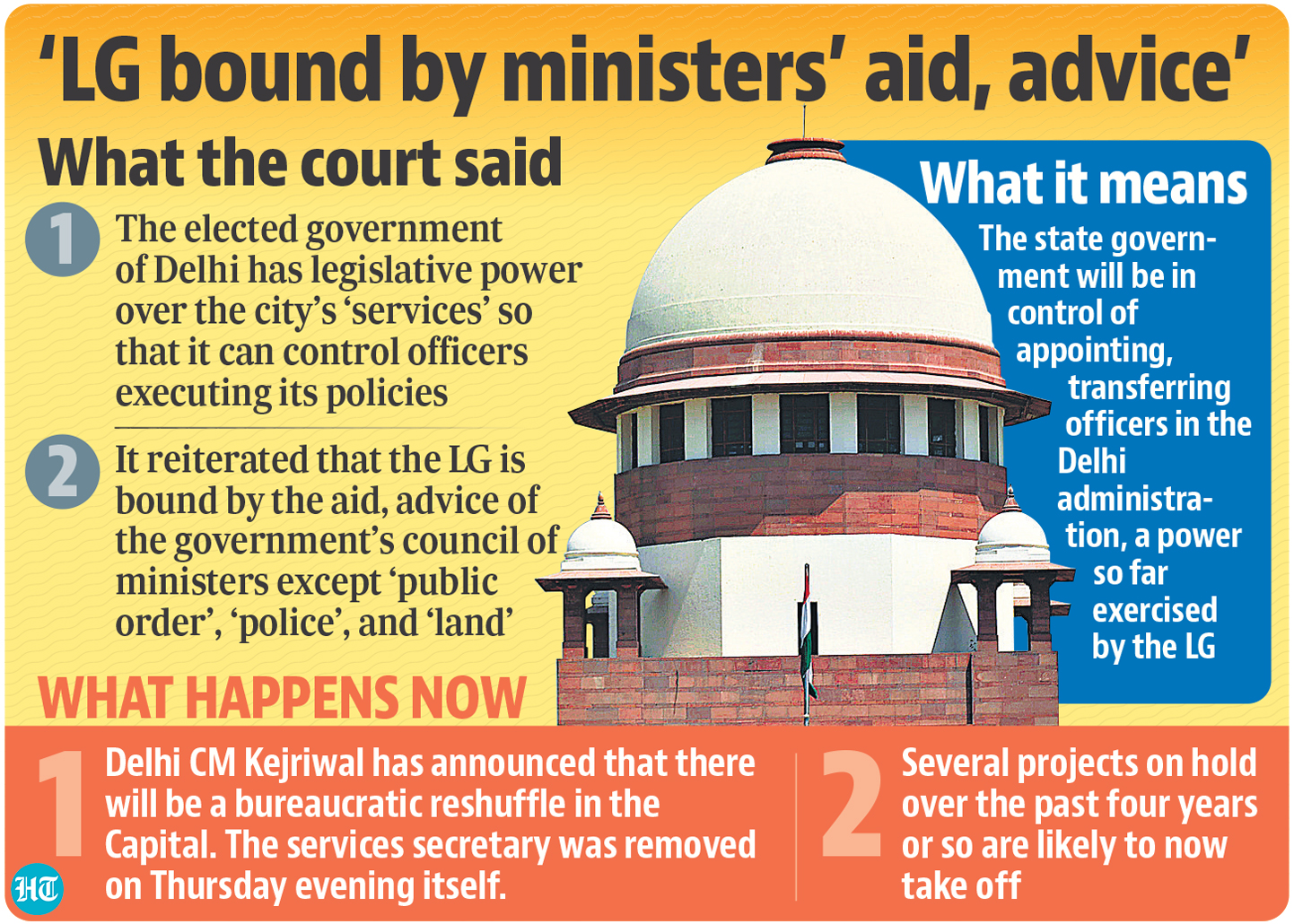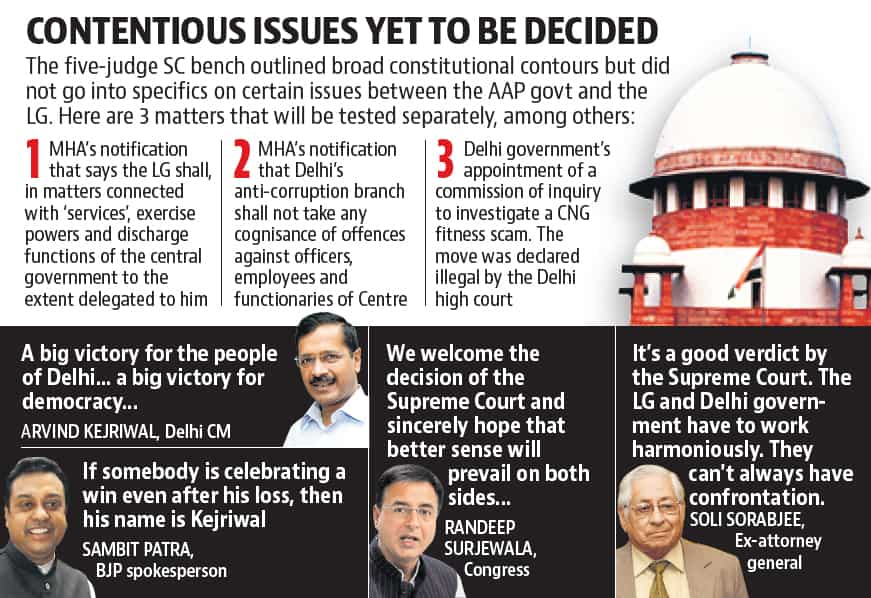Contents
- 1 Introduction
- 2 What are the issues with the functioning of administrative services in Delhi?
- 3 What are the viewpoints of the Centre and Delhi government regarding the administrative services in Delhi?
- 4 About SC ruling on administrative services in Delhi
- 5 What is the extent of the Delhi government’s powers on administrative services?
- 6 What are the implications of the SC ruling on administrative services in Delhi?
- 7 What should be done?
| For 7PM Editorial Archives click HERE → |
Introduction
The Supreme Court of India, in a significant ruling, has affirmed the elected Delhi government’s control over administrative services in the National Capital Territory of Delhi (NCTD). The judgment clarifies a long-standing dispute between the Delhi government and the Centre, determining that the Lieutenant Governor (LG) of Delhi is bound by the advice of the Delhi government council in matters of legislative scope. The decision is expected to reshape the dynamics of governance in the capital, making officers more accountable to the elected government. However, ambiguity remained due to the presence of the National Capital Territory of Delhi (Amendment) Act, 2021.
What are the issues with the functioning of administrative services in Delhi?
Control over Administrative Services: One of the central issues has been the control over administrative services, such as the Indian Administrative Service (IAS). There has been a power tussle between the elected Delhi government and the Central government appointed LG over who holds the authority over these services. This tussle has often led to a deadlock in decision-making, affecting the smooth functioning of the administration. For example, the Delhi government’s proposal for doorstep delivery of rations was stalled due to disagreement with the LG over who had the final say in implementing such policies.
Division of Powers: The Delhi government does not have full statehood and thus does not have complete control over the police, land, and public order. This division of powers has created operational issues. The Delhi government has often complained that it has limited powers to execute its policies effectively.
Legislative Ambiguity: The lack of clarity in the legislative text about the distribution of powers between the Delhi government and the LG has also created problems in the administration. The ambiguity in the reading of Article 239AA of the Constitution, which outlines the powers of the Delhi government, has often resulted in disagreements.
Political Differences: Political differences between the elected Delhi government and the Central government have also been a cause for administrative issues. When the two are led by different political parties, as has often been the case, conflicts tend to arise.
The National Capital Territory of Delhi (Amendment) Act, 2021: This Act passed by the Central government gave more powers to the LG, leading to power tussle and confusion over decision-making in Delhi’s administration.
| Read more: NCT of Delhi (Amendment) Bill, 2021 is against the Principle of Federalism |
What are the viewpoints of the Centre and Delhi government regarding the administrative services in Delhi?
Centre’s Viewpoint on Administrative Services in Delhi
Necessary to have control over administrative services: The Centre has consistently maintained that Delhi, being the national capital, holds a special status that necessitates the Union having control over administrative services. The Centre argues that the absence of this control would impede its ability to discharge its national and international responsibilities effectively.
Delhi’s ministers have adequate powers: The Centre also argues that the Delhi government already has sufficient control over the bureaucracy through the Transaction of Business Rules, 1993, which grants Delhi’s ministers adequate powers to ensure supervisory and functional control over civil services.
Delhi’s status as a Union Territory: The Centre further claims that the LG should retain considerable power due to Delhi’s status as a Union Territory. The 2021 National Capital Territory of Delhi (Amendment) Act supports this viewpoint by giving the L-G more powers.
Delhi Government’s Viewpoint on Administrative Services in Delhi
Need power to implement their policies: The Delhi government, argue that as an elected government, they should have the power to implement their policies effectively and hold civil servants accountable.
Article 239AA : They have contested the Centre’s interpretation of the Constitution, stating that Article 239AA gives the Delhi government legislative and executive powers similar to other states, excluding matters of public order, police, and land.
2021 Amendment Act- overreach by the Centre: The Delhi government has also contested the 2021 Amendment Act, viewing it as an overreach by the Centre into the administrative affairs of Delhi, and an attempt to undermine the powers of the democratically elected government.
Limiting LG power: They believe that the LG should act on the ‘aid and advice’ of the Council of Ministers, as per the 2018 Supreme Court ruling, and that the L-G’s power should not extend to matters within the legislative assembly’s scope.
| Read more: GNCT of Delhi Amendment Bill 2021 and Supreme Court’s Verdict |
About SC ruling on administrative services in Delhi

Supreme Court’s Ruling on Control of Services: The Supreme Court has ruled that the Delhi government has legislative and executive power over all administrative services in the national capital, except those related to land, law and order, and the police. This means that the elected government in Delhi can now control the bureaucracy and hold civil servants accountable.
Impact on the 2015 Notification: The ruling partially overturns a 2015 notification by the Ministry of Home Affairs, which had given control of all services to the LG. This means the LG can no longer exercise unilateral control over all services.
Role of the LG: The court has reiterated that the LG is bound by the aid and advice of the Delhi government’s council of ministers in matters within the legislative scope of the NCT).
Enhancement of Democracy and Federalism: The ruling upholds the principles of democracy and federalism by emphasizing the importance of elected governments and their role in serving the needs of their electorate.
| Read more: The Government of National Capital Territory of Delhi (Amendment) Act, 2021 |
What is the extent of the Delhi government’s powers on administrative services?
The Delhi government has legislative and executive power over all administrative services in the NCTD, as per the Supreme Court’s ruling. However, this power doesn’t extend to matters related to land, law and order, and the police, which remain under the exclusive domain of the Centre. Here’s what this means in more detail:
Control Over Bureaucrats: The Delhi government now has control over bureaucrats, including the Indian Administrative Service (IAS) officers serving in Delhi, and can hold them accountable for their performance. This includes powers over transfers, postings, and appraisals of these officers.
Policy Implementation: The elected government has the authority to direct civil servants in the implementation of its policies. This means that government schemes and initiatives can be executed more effectively.
What are the implications of the SC ruling on administrative services in Delhi?

Empowerment of the Elected Government: The ruling affirms the power of the elected government in Delhi, enabling it to exercise greater control over the bureaucracy. This should, in theory, allow for more efficient and responsive governance, as the government can directly hold officials accountable.
Greater accountability of officials: With the elected government having control over administrative services, officials are expected to be more answerable to the government. This could lead to increased accountability and, potentially, better public service delivery.
Potential for improved policy implementation: The elected government’s increased control over administrative services could lead to more effective implementation of its policies and schemes, as it now has the power to direct and manage the civil servants responsible for executing these initiatives.
Continued legal and political debates: Despite the clarity provided by the Supreme Court’s ruling, the power dynamics between the Delhi government, the Lieutenant Governor, and the Central Government may continue to be a subject of legal and political contention, especially given the National Capital Territory of Delhi (Amendment) Act 2021 which gives more powers to the LG.
Boost to Federalism: By affirming the powers of the elected government in Delhi, the ruling strengthens the principle of federalism in India. It balances the power between the Centre and the states (or in this case, Union Territory), thereby upholding the spirit of cooperative federalism.
Precedent for Other Union Territories: While the ruling is specific to Delhi, it could set a precedent for other Union Territories with legislative assemblies, like Puducherry, potentially leading to a reassessment of the Centre-UT power dynamics.
| Read more: The NCT of Delhi Act, 2021 Enhances Cooperative Federalism |
What should be done?
Effective Implementation of the Ruling: All relevant parties, including the Delhi government, the Lieutenant Governor, and the Central Government, should respect and implement the Supreme Court’s ruling. This includes empowering the elected government in Delhi to exercise its authority over administrative services.
Cooperative Governance: The Delhi government, the Lieutenant Governor, and the Central Government should work cooperatively to ensure smooth and efficient governance in the National Capital Territory. This includes respecting each other’s roles and responsibilities as defined by the Constitution and the Supreme Court’s ruling.
Clarification of the NCT of Delhi (Amendment) Act, 2021: Given the potential for conflict between the Supreme Court’s ruling and the provisions of the National Capital Territory of Delhi (Amendment) Act, 2021, further legal clarification may be needed. This could be pursued through the courts or potentially through legislative amendments.
Increased Accountability Measures: With the elected government in Delhi now having greater control over administrative services, it should implement robust accountability measures to ensure that civil servants are effectively serving the public interest.
Ongoing Review: The implementation and impact of this ruling should be reviewed on an ongoing basis to ensure that it is promoting effective and accountable governance in the National Capital Territory of Delhi.
Sources: Indian Express (Article 1, Article 2 and Article 3), The Hindu (Article 1 and Article 2), Hindustan Times, Times of India and South Asian Voice
Syllabus: GS 2: Indian Constitution and Polity: Issues and challenges pertaining to the federal structure.
Discover more from Free UPSC IAS Preparation Syllabus and Materials For Aspirants
Subscribe to get the latest posts sent to your email.







